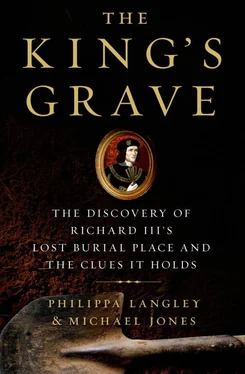Here we encounter the three ‘Ms’ of the Ricardian realm the Tudors have painted for us: misshapen, Machiavellian and murderous. Richard is bent, he does not walk, but scuttles – although his gait carries a restless energy and disturbing power. Richard is Machiavellian – and this is what makes his character so compelling. He is a master of dissimulation, of hiding his true feelings, of putting on a persuasive performance that always masks his true intentions. He beguiles and cajoles, and only occasionally does that mask slip. It is this dissimulation – and its chilling consequences – that makes his character so darkly fascinating. And from this dissimulation the murderous Richard emerges, to kill and kill again.
All rivals are removed without a shred of compunction or remorse. His sights are set on the throne of England, and none will stand in his way, even the young nephews – the sons of Edward IV – whom he has promised to protect. Shakespeare presents us with a villain so alienated from the world around him that he will be cursed by his own mother. Yet his story carries a merciless momentum that leaves us near spellbound in its wake.
It is only when we pull away from this work of theatrical genius that we are left wondering what the real man – rather than the later legend – was like in fact. Was the actual Richard III so terrifying – or was his character progressively blackened by the Tudor dynasty that supplanted him? We still seek answers to some of the controversies that surround Richard’s reign, but at last have an event – both real and symbolic – that can counterpoint the power of Shakespeare’s extraordinary creation. The search for the king’s lost grave, and the remains that lie within it, finally gives us the chance to connect with the reality behind the Tudor myth.
In the grave’s absence – and it was long believed broken up and discarded at the time of the Dissolution of the Monasteries – there was a great debate over Richard’s reputation. One of Richard’s earliest detractors was the Warwickshire priest and antiquarian John Rous. Rous had almost certainly seen Richard on his progress as king in the summer of 1483, and may well have met him. A few years later, with Henry Tudor victorious at Bosworth and crowned as King Henry VII, Rous wrote a history of the English kings that heaped insult after insult upon Henry’s predecessor.
Rous began with Richard’s birth, around which his claims were nothing less than staggering: ‘Richard was born at Fotheringhay in Northamptonshire,’ he commenced, accurately enough, before adding, ‘and retained within his mother’s womb for two years, with teeth and hair to his shoulders.’ Here is the origin of the monstrous birth that Shakespeare made so much of. But Rous had only just begun: ‘At his nativity Scorpio was in the ascendant… and like a scorpion he combined a smooth front with a stinging tail.’ To make his astrological point Rous – well aware of when the king was actually born (on 2 October, under the sign of Libra) – deliberately moved Richard’s date of birth forward by three weeks. He then accused him of murdering his nephews, his own wife and the saintly Henry VI, before finishing: ‘This King Richard, who was excessively cruel in his days, reigned for three years and a little more, in the way that the Antichrist is to reign. And like the Antichrist to come, he was confounded at his moment of greatest pride.’
The moment of pride – a veiled reference to Bosworth being the judgement of God on Richard’s rule – would become a staple theme in Tudor histories of the king. Richard III in fact ruled for slightly less than two years and two months. In adding a year to the reign, so that it would correspond to the rule of the Antichrist prophesied in the Book of Revelations, Rous played fast and loose with historical accuracy. His main concern was to win the patronage of the new Tudor king, Henry VII. Unfortunately, he had written an earlier work – a history of the Earls of Warwick, in both English and Latin – in which he praised Richard’s kingship, and although he was able to recall the Latin copy and erase this unfortunate reference, the English version escaped his clutches. In it, Rous was as fulsome in his praise for Richard as he was later to be damning in his criticism: ‘The most mighty Richard,’ he began, ‘all avarice set aside, ruled his subjects in his realm full commendably, punishing offenders of his laws, especially extortioners and oppressors of his commons, and cherishing those that were virtuous, by which discreet guiding he got great thanks of God and love of all his subjects, rich and poor, and great praise of the people of all other lands about him.’
It is hard to imagine a more dramatic about-turn, or two more different views of a crucial period in English history. Rous’s principal objective seemed to be a desire to flatter the reigning king – first Richard, by praising his rule, and then Henry, by denigrating his predecessor. And if there is an element of truth in both accounts, the one almost the polar opposite of the other, this begins to show us why Richard III – the man and the monarch – is in turn both so fascinating and so controversial.
Rous’s earlier praise of Richard’s kingship is well-known and frequently quoted. But his preamble to it has received far less attention. Yet it is equally important. In it, Rous not only commended Richard’s kingship, he also supported his right to rule. The Tudors – and many who followed them – believed Richard was a usurper, seizing a throne not rightfully his from his nephews, the Princes in the Tower, the sons of Edward IV. But Rous implied that the king’s taking of the throne was legitimate, stating that his claim was based on a lineage issuing from ‘very matrimony, without any discontinuance of any defiling in the law, by heir[s] male lineally descending from King Henry the Second’.
In general terms, Rous was praising Richard’s distinguished lineage, which could be traced back to the kings of the twelfth century. But he was also making a specific point. By ‘very [true] matrimony’, Rous meant a marriage ceremony properly observed and legally validated. And here he was comparing the validity of the marriage of Richard’s parents, Richard, Duke of York and Cecily Neville, with that of Richard’s brother Edward IV and his queen, Elizabeth Woodville, the latter being a deeply controversial marriage that took place in secret, with few witnesses and not even in a church, one not announced to court and country until four months after it had taken place.
When he took the throne in 1483 Richard had argued that this marriage was invalid – because Edward IV had in fact been contracted to marry someone else – and thus its offspring (including Edward’s two sons, the Princes in the Tower) were illegitimate. Rous, in his reference to ‘discontinuance’ [invalidation] through ‘defiling in the law’ [legal objection], was accepting and supporting the king’s claim. This claim was actually enrolled in the records of Richard’s first parliament in 1484, though subsequently suppressed by the Tudors.
As a clergyman, Rous may have sympathized with Richard’s moral stance on this issue. Edward IV’s court had, particularly in its last years, been notoriously hedonistic. And his approval also took a swipe at Henry Tudor’s claim to the throne, which had been publicized in 1484, the year before Tudor became king. For the future Henry VII was almost certainly of bastard descent on both sides of his family tree – from his Valois and Beaufort origins – and so unfit to rule, as Richard had made clear in a general proclamation to the realm. Rous may well have agreed with it. If this was so, it gave an added urgency to his wish to please the new regime once Henry had come to the throne.
Читать дальше












